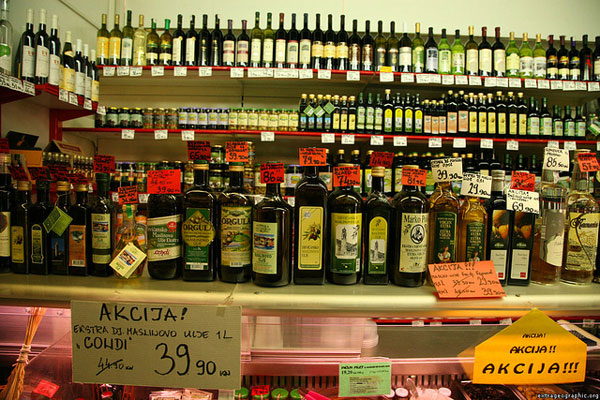 The currency of Croatia is the kuna (kn). The marten is divided into 100 lip (in practice, lip is not used, rounding bills to equal values). Multiple transactions, especially payment for accommodation, can be made in euro. During the preparation of the guide, at the end 2004 r., currency rates developed as follows: euro:
The currency of Croatia is the kuna (kn). The marten is divided into 100 lip (in practice, lip is not used, rounding bills to equal values). Multiple transactions, especially payment for accommodation, can be made in euro. During the preparation of the guide, at the end 2004 r., currency rates developed as follows: euro:
1 € = 4,35 PLN;
because: 1 € = 7,3—7,6 kn,
1 PLN = 1,68-1,75 kn.
Compared to Western countries, Croatia is not expensive, but e.g.. for food in shops and meals in restaurants you have to pay more than in Poland. Two people staying at the campsite and eating supermarket products have to pay approx. 200 kn per day, not counting journeys and additional attractions. It is a bit more expensive in Istria and around Rijeka.
Food and dish prices. Compared to Poland, food in Croatia is not cheap - especially on the coast, where the prices of vegetables and fruit are particularly high. For example: loaf of bread 5-6 kn, canned meat and fish 2,99-4,35 kn, cookies 7.10-11.18 kn / pack, tomatoes 5-15 kn / kg, cucumbers 6-7 kn/kg, tangerines 15 kn/kg, sweet cherries 15-25 kn, peaches 5-25 kn, moral 15 kn, brandy 25 kn/liter, Prosek wine 30 kn/liter.
For a one-course dinner in a restaurant you have to pay at least 40-60 kn plus drinks. Sample prices: hamburgers and hot dogs 8-28 kn, soups 10-25 kn, Salads 8-35 kn, spaghetti 20-42 kn, Omelette 30 kn, pizza 21-45 kn, Slice of pizza 7-12 kn, risotto 30-60 kn, Kebabs 26-55 kn, fish dishes 45-80 kn, poultry dishes 50-55 kn, octopus dishes 38-45 kn, calamari 27-60 kn, Meat dish 28-120 kn, desserts from 20 kn, ice cream 4—5 kn / ball. Drinks: coffee 6-20 kn, tea 6-15 kn, beer 0,5 liters 12-15 kn.
Tax refund. If you have made a purchase in Croatia for at least 500 kn, you can get a tax refund at the border upon departure. You need to show the appropriate form for this (tax check, that is Porezni ćek, Tax cheque). You can get it at some stores selling expensive souvenirs and jewelry, e.g.. in Dubrovnik. Learn more about tax refunds: Customs Board of the Republic of Croatia (Customs Administration of the Republic of Croatia; tel.01/6102333, www.carina.hr).
Currency Exchange, exchange offices, bank, ATMs. Money can be exchanged in numerous exchange offices (currency exchange), travel agencies, at almost all post offices, in many banks, some hotels and campsites. Commissions are similar and range from 0,8 do 3,5%. Exchange offices at post offices offer slightly more favorable rates and lower handling costs. Although you can easily buy kuna for foreign currency, it doesn't hurt to take a receipt (redemption calculation), which may come in handy during a reverse transaction. Exchange offices have euro, dollars and all common currencies. There is also Slovenian money, Hungarian, Czech and Slovak. Polish ones are also slowly emerging.
The ATM network is decently developed, especially in larger cities and resorts.
Cashless payment methods
Credit cards (credit card) American Express, Diners Club International, EuroCard, MasterCard and Visa are accepted in almost all major restaurants, hotels, shops etc..
When exchanging traveler's checks (traveler's check) a commission should be reckoned with.
Insurance
Unlucky people, who will have to undergo hospital treatment in Croatia, will face the need to pay the bill. You can be insured in the event of such an event. In addition to medical expenses and emergency return flights, a good policy should include insurance against loss or theft of money and luggage, and possibly also damage to rented cars or scooters. If anything happens, be sure to keep all medical bills, and if possible, check with your insurance company before making a larger deposit. In the event of theft, after reporting a crime, you have to get a copy of the police report, otherwise the claims may not be recognized.
Health and medical care
Polish tourists benefit from free healthcare in public health centers and hospitals (hospital) to a very limited extent - only in an emergency (accident, fainting). Willing to take advantage of free assistance, you must show a Polish passport and confirm insurance (e.g.. show your insurance booklet). A private medical visit costs 16-20 $; day in hospital approx. 50 $ (without the cost of surgery and medications) . Therefore, insurance against medical expenses is advisable, illness or accident.
Security
Croatia is a safe country – the threat of common crime does not differ from European standards. People traveling by car on Croatian roads may be potentially at risk. It has to do with the reckless driving of many local drivers. Therefore, contact with the police mostly concerns motorists, especially these, who break the rules. The fines are high!
However, the remnants of the war must not be forgotten – despise. As far as the main highways, the vicinity of the Adriatic Highway and the holiday resorts are completely safe, so much driving on side roads in the interior of the country, still be careful not to go to the side of the road, especially with the ruined ones, deserted buildings. The absence of the owners may indicate that these areas are mined. Most of the misfires were left in the rarely visited Slavonia, in the countryside (from Knin to Karlovac) and in the vicinity of Zadar. The Croatian mine clearance center is located in the city of Sisak (www.hcr.hr, tel.044/554151).